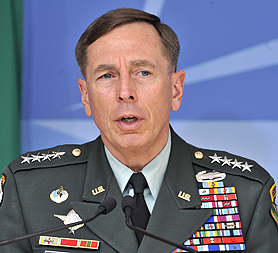Petraeus: no change in Afghanistan strategy
Updated on 01 July 2010
General David Petraeus calls no change in the Afghan strategy but will focus on the rules of engagement – rules which are key to soldiers’ morale, Colonel Richard Kemp tells Channel 4 News, and therefore, key to success in Afghanistan.

Newly installed as US commander in Afghanistan, Gen Petraeus told Nato officials in Brussels he would not seek to alter the counterinsurgency strategy put in place by his predecessor – the ousted General McChrystal.
Colonel Richard Kemp, former commander of British forces in Afghanistan, told Channel 4 News that while many are impatient to see an end to the escalating violence and deaths in Afghanistan, Petraeus' speech would have been "well-received".
The general is right to stick to the same strategy, he said, adding: "You've got to hold your nerve in counterinsurgency – it takes time and can often get worse before it gets better."
Petraeus was also previously McChrystal's boss, Col Kemp said, "Petraeus would have approved it (the strategy) himself, so it makes sense to keep it in place," Col Kemp said.
However, he pointed out that we may see changes in the tone and style of new the new four-star general.
Petraeus has previously been hailed as a hero for his success in Iraq and is seen by many as Obama's best hope of turning around the conflict in Afghanistan.
"Petraeus might try similar approaches in Afghanistan, but it's very different to Iraq, which he knows," Colonel Kemp said. The two central issues are avoiding civilian deaths and keeping up the soldiers' morale, he added.
In his speech today, Petraeus said the decisive terrain in a counterinsurgency is the human terrain, "and therefore you much do everything humanly possible to protect the population, and indeed, again, to reduce the loss of innocent civilian life".
He said the rules of engagement did not need to be changed, but rather, he would look at the way the rules were applied.
"There are concerns among the ranks of some of our troopers on the ground that some of the processes have become a bit too bureaucratic," he said.
The allied forces would need to look "very hard at how the rules are implemented and ensure that there is even implementation across all units," he added.
Colonel Kemp said he had heard similar complaints from soldiers – whose operations were hampered by the bureaucracy of wading their way through tiers of command in order to gain permission to use certain weapons, for example.
"It is understandable (to go through multiple chains of command) as they are trying to avoid mistakes being made," Col Kemp said. "But there has to be a balance – over bureaucratise and the delays build, by which time it's too late to act."
Soldiers' morale is key to the fight. "You cannot just expect a soldier to take a pounding – and then give nothing back. We can't have things so restrictive that soldiers' can’t protect themselves," he said.
Military commanders do have a tendency to impose their own extra safety levels, adding to the bureaucracy, Col Kemp said.
With the campaign in Afghanistan suffering its bloodiest month on record during June - at least 102 allied deaths during the month - Petraeus acknowledged support amid growing public fears for the course of the war.
"It was very heartening to hear the support that was voiced there (North Atlantic Council) even as we know the very difficult times that we have seen in Afghanistan, where there has without question been tough fighting and where there have been tough casualties, although where there have also been areas of progress in recent weeks and recent months, and where we are determined to achieve further progress in the course of the months ahead," he said.
Nato secretary-general Anders Fogh Rasmussen promised to stay committed for "as long as it takes to finish our job".
He added: "Obviously, that is not forever. Our mission will end when the Afghans are capable to secure and govern the country themselves."
Petraeus was unanimously voted in by the US Senate as the new Afghan commander. US troops now account for two-thirds of the 122,000 strong force in Afghanistan.



